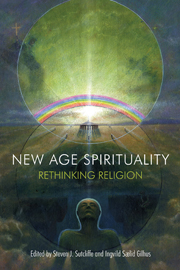Book contents
- Frontmatter
- Contents
- Introduction: “All mixed up” – thinking about religion in relation to New Age spiritualities
- Part I Rethinking New Age spiritualities
- Part II Comparing New Age beliefs and practices
- Part III Putting new spiritual practices to work
- Conclusion: New Age spiritualities – “good to think” in the study of religion
- Contributors
- Further reading
- Bibliography
- Index
Introduction: “All mixed up” – thinking about religion in relation to New Age spiritualities
- Frontmatter
- Contents
- Introduction: “All mixed up” – thinking about religion in relation to New Age spiritualities
- Part I Rethinking New Age spiritualities
- Part II Comparing New Age beliefs and practices
- Part III Putting new spiritual practices to work
- Conclusion: New Age spiritualities – “good to think” in the study of religion
- Contributors
- Further reading
- Bibliography
- Index
Summary
THEORIES OF RELIGION AND NEW AGE SPIRITUALITIES
“New age” is among the most disputed of categories in the study of religion in terms of agreeing content and boundaries. Because such disputes reproduce in miniature the debate about the cross-cultural stability of the category “religion”, studying “new age spiritualities” tantalizingly reproduces issues central to defining and theorizing religion in general. It is the aim of this volume to bring two areas of research normally kept apart – empirical study of new age spiritualities and serious theories of religion – into close and productive interaction, with a view to opening up a new primary data set for general theories of religion.
The classical theories of religion – for instance by Edward Burnett Tylor, James Frazer, William Robertson Smith, F. Max Müller, Sigmund Freud and Émile Durkheim – were built on a varied pick and mix of religious phenomena. Some of these authors consulted ancient religions, as did Frazer and Robertson Smith; some looked to India as Müller did (without actually going there); while many were interested in so-called “primitive” cultures, as were both Tylor and Durkheim. None of these “armchair” masters did fieldwork, but relied on reports from missionaries, travellers and other reportage. And even if they tried to build their foundation on the data of pluralized formations, their ideas were mainly inspired by their concept of Christianity, as Evans-Pritchard persuasively argued in Theories of Primitive Religion (1965).
- Type
- Chapter
- Information
- New Age SpiritualityRethinking Religion, pp. 1 - 16Publisher: Acumen PublishingPrint publication year: 2013



